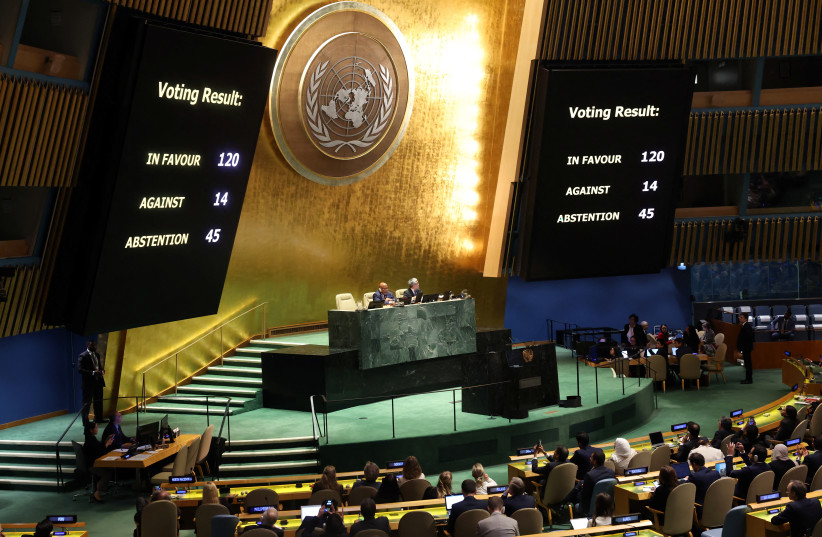Some may think this is solely Israel’s problem. That the double standard will stop there. I disagree.
https://www.jpost.com/opinion/article-782647The genocide case in the International Court of Justice (ICJ) brought by South Africa against Israel lifts the veil over a process that has been affecting the entire corpus of international law – already far exceeding its roots in the Israeli-Palestinian conflict. This is the “Palestinization” of international law.
International law has always been deeply infested with politics, certainly when regarding the Laws of Armed Conflict. No country is eager to restrain itself according to external limits imposed upon its freedom to use its powers. Those who pushed for such restraints were usually those who could benefit from them, and those who objected were those who could lose their advantage.
It usually took dramatic and unfortunate events, which exacted a terrible price, to bring about significant leaps in law that truly benefit humanity. The most important of these was War World II, which led to the 1945 Geneva Conventions, and soon after, in 1948, the Convention on the Prevention and Punishment of the Crime of Genocide, which is now the focus of the ICJ.
And now, once again, politics are consuming international law, pruning it back to suit political agendas. International law has been “Palestinized.”
You need not fully agree with Israel’s policies or actions to realize that – due to its isolated international stance, facing tens of Arab and Muslim countries and being caught up in the clash between the superpowers – Israel has become the punching bag of the international system. The absurd and overwhelmingly disproportionate number of resolutions lodged against Israel in international organizations – such as the UN – has become normalized.

This case is not about Israel, it is about the future of international law
For example, according to UN Watch, from 2015-2022, the UN General Assembly adopted 140 resolutions on Israel and 68 on other countries. Between 2006-2022, the UN Human Rights Council adopted 99 resolutions against Israel; 41 against Syria; 13 against Iran; 4 against Russia; and 3 against Venezuela. Regardless of the tens or even hundreds of thousands of civilian deaths each year in conflicts around the world – the unimaginable atrocities and millions displaced annually – an extra-terrestrial landing on Earth would be certain that the Israeli-Palestinian conflict is this world’s main problem.This does not stop at the gates of politics: willing or not, the entire body of international law is now being “Palestinized.” Core concepts of international law are literally being refashioned to accommodate Palestinian interests. The examples are abundant and – even more troubling – they have seeped into the mainstream. They have changed the understanding of international law, which is now viewed through a Palestinian prism.
AFTER MORE than 100 days of war, Israel has not yet taken control of the Gaza Strip which it left in 2005, evacuating all its settlements, and where Hamas has proudly ruled for 17 years, with complete civil and security dominance. Any Israeli who would have dared cross the border would have been either shot or taken hostage.
Yet, for most of the international community, Gaza is still “occupied” by Israel. A new framework was invented, mostly based on Israel’s control of the land borders (conveniently ignoring the Egyptian one of course), the air space, and the coastline. The absurdity hit an extreme when the South African legal delegation claimed before the ICJ that Israel had no right of self-defense following the October 7 massacre and that it is conducting operations in a territory it already “occupies.”
Then came the “apartheid” allegation against Israel.
What we know about it from the South African experience is no longer relevant: A country that has been widely recognized as the only democratic state in the Middle East, is now being demonized as the world’s worst violator of human rights, even with respect to its own two million Arab citizens, who enjoy unparalleled freedoms compared to most, if not all, Arab states. Israeli Arabs can vote, be elected to public office, and have even served as government ministers.
Numerous principles of International Humanitarian Law – the Laws of Armed Conflict – have been twisted, to cast Israel as a war criminal. From the principle of distinction to necessary precautions in attacks, to proportionality, to the means and methods of war – the standards are raised when it comes to Israel. Furthermore, even basic notions of international law, such as the definition of a “state,” have been reformulated to fit into the Palestinized paradigm.
But the allegation of genocide is the final nail in the coffin.
The attribution of “the crime of all crimes” to Israel, which as its counsel rightly argued before the ICJ – was the victim of genocidal acts on October 7 and certainly not the perpetrator, completes the metamorphosis of international law. With the diminution of the primacy of genocide, the escalation has reached a climax: the emergence of a new, Palestinized international law.
Some may think this is solely Israel’s problem. That the double standard will stop there. I disagree.
Even if the ICJ rules in Israel’s favor, nothing is sacred anymore. A growing list of countries have announced their support for South Africa’s argument. In the balance between politics and principles, politics prevails. Rest assured, some ICJ judges – even if in the minority – will rework the concept of genocide to “accommodate” at least some of Israel’s actions. Other countries will soon need to meet these new criteria.
With the vulgarization of the crime of genocide, the blunt disrespect to what it really represents, an entire framework of laws (and crimes) built on the ashes of Auschwitz will lose its integrity, its internal hierarchy, and its relevance. It took almost 80 years for the humanitarian achievements that followed the atrocities of World War II to descend to petty politics, to be “Palestinized” and trivialized.
